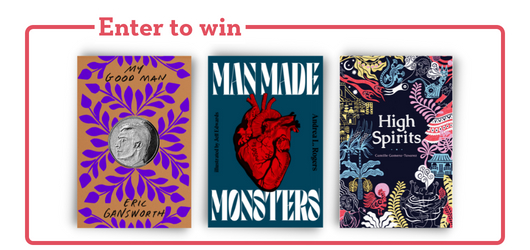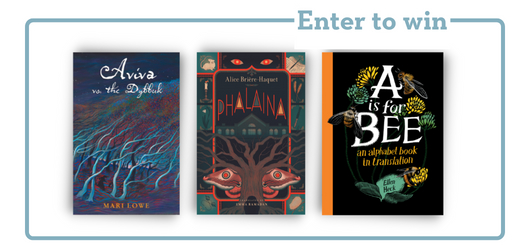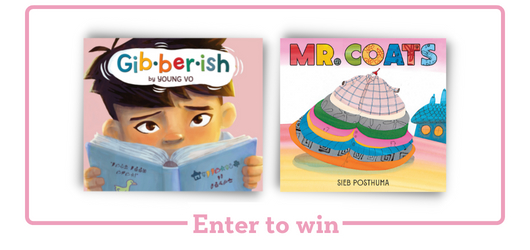Jaclyn Moriarty on the complexities of "good" magic

Executive Editor Matt Sutherland Interviews Jaclyn Moriarty, Author of Oscar from Elsewhere
Before all the dragons, wizards, hobbits, and unicorns appear in the pages of fantasy books, one of the most fanciful creatures of all pays a visit to the imaginations of fortunate authors: the muse. Mysterious, elusive, rarely punctual, but an endless source of genius, every muse has its own personality and every writer strives to remain on good terms with the one they court.
Long acclaimed for her wildly creative novels for young adults, there is no doubt Australian author Jaclyn Moriarty maintains a fantastic working relationship with her own writing muse. In anticipation of the US release of Jaclyn’s Oscar from Elsewhere, we asked Foreword‘s Executive Editor Matt Sutherland to connect with her to talk about this latest project, her writing process, and what’s next for her talented pen.
On an innocent outing to his local skate park, Oscar falls for the ol’ looking glass ruse and suddenly he finds himself in the Elven city of Dun- sorey- lo- vay- lo- hey, in the Southern Climes of a new world. A fun little Alice in Wonderland connection. In addition, a careful reader will see that you were influenced by numerous other writers, tales, and storytellers—Goldilocks, genies and their bottles, tame flying dragons, as well as your other character names—Astrid, Bronte, Imogen—with literary connections like Oscar. Please tell us about your lifetime of reading and preparation for writing Oscar from Elsewhere?
This question is like poetry! Thank you for asking it.
Like many writers, I grew up reading obsessively. I loved reading, but also: we didn’t have a TV; there was a shelf full of my mother’s childhood favourite books in our playroom; Mum took us to the local library once a week to borrow more; my older sister was a passionate reader, always insisting that I “read this book—trust me, it will change your life,” (we still say this to each other these days); my younger sisters liked me to read to them; and I was extremely shy so reading was my escape.
My favourite books were always the magic-in-real-life or magic-out-of-the-corner-of-your-eye stories because they made it perfectly possible that magic could happen to me. Some favourites were the Mary Poppins books, the Narnia books, E.Nesbit, Enid Blyton, Arthur Ransome, and Roald Dahl. I still regularly read children’s books, both the classics and contemporary, always solemnly telling myself that this is “necessary professional development.”
Imogen and Oscar trade storytelling responsibilities, chapter by chapter, and are privy to what each other writes in real time, which makes for some lively conversations and realizations, as they both get a serious look inside the other’s thoughts. Quite often, what’s on their minds are the same anxieties and concerns of a typical young teen anywhere in this world. Was it important to you to create a world with recognizable features for modern young readers?
My first books were YA fiction set in real-world high schools. When I shifted into fantasy, I wanted to take the characters as seriously as I had in the earlier books. When I’m reading fantasy, the characters have to be emotionally complex and real to me, or I don’t believe in the worlds they’re exploring. So I’m very glad you think they have recognisable features!
Imogen admits to having quite a temper, referring to it as a lion that sleeps in her throat. Usually, she’s pretty good at controlling the lion but, as the oldest, she frequently turns on her siblings and friends and says hurtful things. She’s also frustrated that “bright magic,” the good magic in her world, comes with pesky conditions—as evidenced by the bright magic spell threatening the Elven city: “Typical bright magic being tricksy,” says the Elven King Maddox when talking about how the silver arrived half an hour early to cover his city. Can you talk about how and why you developed your versions of magic in the book? And why you made it a major pet peeve for Imogen, specifically?
In my previous Kingdoms and Empires books, the focus was on shadow magic, and particularly the complexities of “evil,” and the possibility that “villains” are not beyond redemption. So in this one I wanted to explore the complexities of bright magic, the “good” kind. The main character in The Stolen Prince of Cloudburst, Esther, had been entranced and delighted by bright magic. Esther’s older sister Imogen is very different to Esther: she’s more straightforward and literal, more likely to be impatient with poetry or whimsy.
I think I’m like Esther myself, in that I’m absent-minded and a bit too fanciful, but I can also get pretty cranky when things are too whimsical or unnecessarily convoluted. (Maybe left over from when I used to be a lawyer.) Sometimes I’ll get emails from my son’s school, or from his athletics club, and will end up shouting at the screen: WHAT ARE YOU TALKING ABOUT?! GET TO THE POINT!
I knew that Imogen would not have the patience for the tricksiness of bright magic—that she’d be shouting at it: GET TO THE POINT!! So she was the right person to turn bright magic inside out and explore its flaws and shadows.
As impressed as Oscar is by the miracles and magic of the Southern Climes, he’s a little dismissive of this low-tech new world until he realizes that these people are plenty capable of creating mobile phones, computers, airplanes, and all the other impressive technology of his own world—but they chose not to. The reasons for this will serve to add a wonderful layer of nuance for your readers, some of whom might spend a bit more time with modern technology than their parents or teachers would like. Can you talk about your personal rules for salting a story with subtle lessons?
When I was a child, the moment I sensed a lesson coming I fell right out of the story. I felt betrayed by the author—one moment, they were telling me a story, we were in it together, respecting one another as equals in the imaginative realm. The next, the author was out in the front of the classroom lecturing me! I was always outraged.
So my first rule is that readers don’t want to learn any lessons at all. I never set out to teach them anything. Maybe a character might learn something, or a lesson might emerge by chance. Hopefully those kinds of lessons will fold into the world of the story and the reader and I will carry on as if nothing has happened.
Quirky things abound in the new world Oscar finds himself—maps that maddeningly skitter locations across the page, harmless looking mud puddles that eat flesh, cricket-loving pirates prone to murder, and much, much more. But, at least for the six children, their tour around the Southern Climes is driven by riddles and clues, one leading to the next, as they seek to save the Elven city. Okay, do tell: What’s with your fascination with puzzles and problem solving? Does writing a novel serve to make you feel like a quester on a quest?
I think life is full of quests with puzzles and problems built into them. Like the quest to find a replacement light cover for the one that fell to the floor and crashed when I was trying to change the globe. Or the quest to track down the particular brand of olive oil soap that my mother bought in a country town, twenty-five years ago, and fell in love with. (The internet has made quests a lot less challenging but luckily there are still light covers that are no longer made and that are a different size to every other light cover in the world, and there are still soap companies in country towns without websites.) So writing a novel definitely feels like I’m a quester on a quest!
Sorry, I won’t let this go: What clues would you give to a wannabe fantasy writer?
Ha! Well, one suggestion I have is to read The Tough Guide to Fantasy Land by Diana Wynne Jones. I discovered and fell in love with Wynne Jones’s books as an adult, and I think she fuses magic-in-real-life, delightfully complex plots, and genuine humour perfectly. Her Tough Guide to Fantasy Land is a very funny, comprehensive dictionary of terms commonly encountered in the world of fantasy. For example:
“Fever is something that follows a wound: it never has any other cause (except possibly PLAGUE, which you will not catch). It will cost [you] a day or so of sweating and strange DREAMS before someone fetches a HEALER. Then a drink of herbal tea will have you right in no time.”
The book is a good reminder to try to avoid clichés, to play with the conventions of fantasy, making them your own, and not to take yourself too seriously. Otherwise, I recommend reading widely in both the classic and contemporary fantasy genre (and across all of the genres, actually) and then saying to yourself: “Now I will write something completely different, but better.” Always set yourself the loftiest goals.
With his happy go lucky, what me stress, personality, Oscar is quite comfortable in this new world, considering the circumstances. But he has his What if I never get home? moment and it nearly knocks him to his knees. But his home life isn’t all that rosy and the friendships he develops with the otherworldly children prove to be irresistible, and you provide him with a best-of-both-worlds solution. So, talk about some of your intended readers? What would you like them to find and take away from your stories?
To answer that I should explain some of the back-story behind the book. Early one morning a few years ago, when I was still half-asleep, and inside a dream, an image came to me of a shy girl playing the piano in a small house in Sydney, Australia. As she played, she found herself transported into the Kingdoms and Empires.
When I woke up properly, I was excited by the idea of a new book in which a child from our world visits the Kingdoms and Empires. (In the previous books, the Kingdoms and Empires had been self-contained.) But time went by and my new book wasn’t progressing. I couldn’t seem to get the shy little girl to do much except play the piano.
Then one day, I was walking by the local skate park where my own twelve-year-old was skating with his friends. This was a pretty wild group of kids: they got into trouble at school regularly, were passionate about sports and skating, and found the idea of reading for pleasure unfathomable. Also, they’d just started travelling back and forth across the city, on public transport, in search of the biggest and best skate park in all of Sydney. In fact, (I realised, as I watched them skate that day), they were on a very serious quest—one with rules, a language, monsters (security guards; cranky, scolding adults) and heroes (older skaters with Instagram accounts and sponsors). That’s when I decided that the first person from our world to visit the Kingdoms and Empires should be a wicked, confident, skater kid.
So, if I have a message for readers, it’s that every one of us is special in our own way, that we all deserve adventures, and that if we’re a little wild and wicked it might be partly because we’re lonely and hurt. (It might also be because we’re just naturally a little wild and wicked, which is also fine.)
Can you talk about what’s next for you? Are you currently at work on another book?
I’ve just finished a new book, and am about to begin editing it. Some of the characters from Oscar will feature in minor roles (including Oscar himself) but the main character is a shy girl named Lillian Velvet who lives in a small house in Sydney, Australia, and plays the piano. On her tenth birthday, her grandmother gives her a pickle jar filled with gold coins, and she begins to find herself being transported into the Kingdoms and Empires for short and unexpected adventures. (Also, I’m just finishing up a novel for grownups about time travel, which has the working title: The Tango Dancer’s Guide to Stopping Time.)
Matt Sutherland



